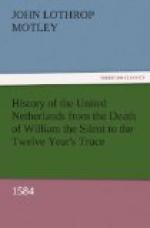The Council consisted of three members from Brabant, two from Flanders, four from Holland, three from Zeeland, two from Utrecht, one from Mechlin, and three from Friesland—eighteen in all. They were empowered and enjoined to levy troops by land and sea, and to appoint naval and military officers; to establish courts of admiralty, to expend the moneys voted by the States, to maintain the ancient privileges of the country, and to see that all troops in service of the Provinces made oath of fidelity to the Union. Diplomatic relations, questions of peace and war, the treaty-making power, were not entrusted to the Council, without the knowledge and consent of the States General, which body was to be convoked twice a year by the State Council.
Thus the Provinces in the hour of danger and darkness were true to themselves, and were far from giving way to a despondency which under the circumstances would not have been unnatural.
For the waves of bitterness were rolling far and wide around them. A medal, struck in Holland at this period, represented a dismasted hulk reeling through the tempest. The motto, “incertum quo fate ferent” (who knows whither fate is sweeping her?) expressed most vividly the ship wrecked condition of the country. Alexander of Parma, the most accomplished general and one of the most adroit statesmen of the age, was swift to take advantage of the calamity which had now befallen the rebellious Provinces. Had he been better provided with men and money, the cause of the States might have seemed hopeless. He addressed many letters to the States General, to the magistracies of various cities, and to individuals, affecting to consider that with the death of Orange had died all authority, as well as all motive for continuing the contest with Spain. He offered easy terms of reconciliation with the discarded monarch—always reserving, however, as a matter of course, the religious question—for it was as well known to the States as to Parma that there was no hope of Philip making concessions upon that important point.
In Holland and Zeeland the Prince’s blandishments were of no avail. His letters received in various towns of those Provinces, offered, said one who saw them, “almost every thing they would have or demand, even till they should repent.” But the bait was not taken. Individuals and municipalities were alike stanch, remembering well that faith was not to be kept with heretics. The example was followed by the Estates of other Provinces, and all sent in to the General Assembly, soon in session at Delft, “their absolute and irrevocable authority to their deputies to stand to that which they, the said States General, should dispose of as to their persons, goods and country; a resolution and agreement which never concurred before among them, to this day, in what age or government soever.”




